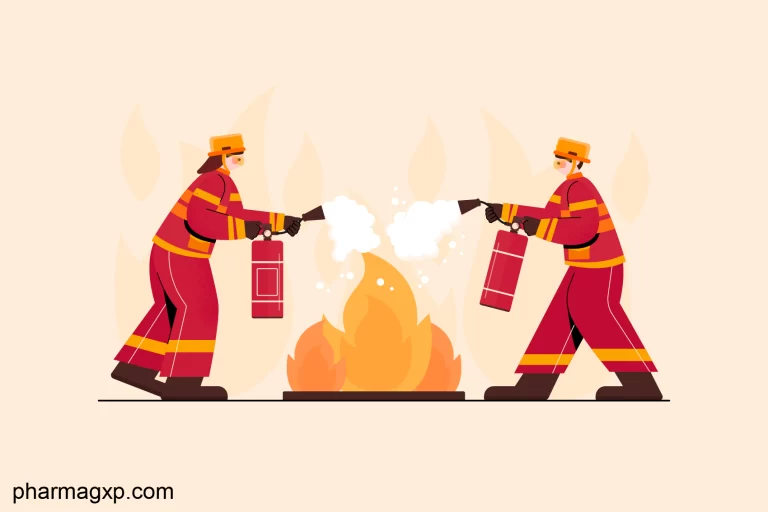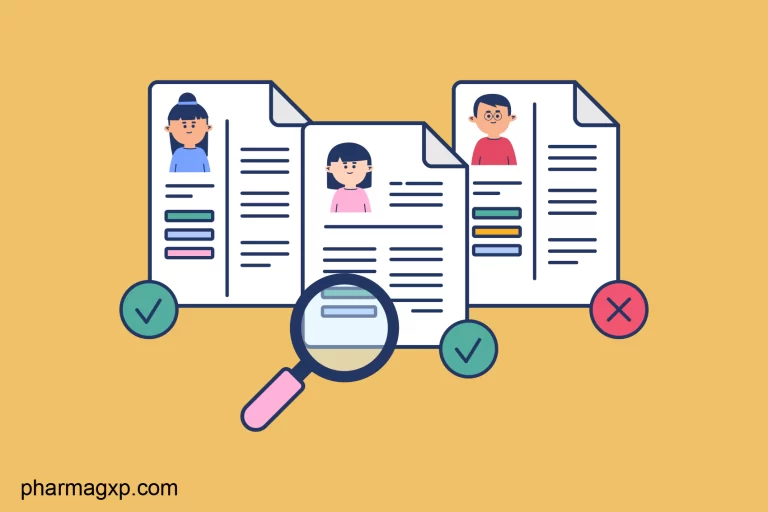Pharma Interview: 7 Powerful Non-Technical Questions to Crack

Getting the pharma interview? Great start.
Nailing it? That’s where you win.
Most candidates obsess over technical questions.
But guess what separates the top 10% from the rest?
Non-technical mastery.
That’s where hiring decisions are actually made.
We surveyed pharma pros.
Here’s what recruiters really ask (and how to crush it).
Table of Content
1. Tell Me About Yourself!
The most common interview opener.
But also…
The easiest one to mess up.
Most candidates start rambling.
Talk about childhood. Hobbies. Family.
Stop.
This is not your autobiography.
Here’s how to win:
✅ Think of it like this: “Summarize Yourself.”
Be crisp.
Be relevant.
Make them want to ask you more.
🔥 Sample Format (for Freshers):
Hi, I’m [Your Name], from [Location].
I’ve recently completed my [Your Degree] and I’m excited to kickstart my career in the pharma industry [Your Area of Interest].
I’ve always been drawn to [Industry/Role-specific interest], and I’m looking forward to applying what I’ve learned and growing within a company like yours.
🔥 Sample Format (for Experienced):
Hi, I’m [Your Name], currently working as a [Designation] at [Company].
I have [X] years of experience in [Your Function/Department] with hands-on exposure to [Key Area – e.g., GMP compliance, QA audits, etc.].
I’m now looking to step into a role where I can contribute more strategically while continuing to build on my core strengths.
💡 Pro Tips:
- End with why you applied.
- Show ambition.
- Keep your tone confident but not too sure of yourself.
Don’t talk about your family, hometown, or what your uncle does, unless asked.
Golden Rule: Short. Sharp. On point.
Because the better your start,
the more control you have over the entire interview.
This isn’t a bio-data dump.
It’s your 30-second elevator pitch.
Focus on:
- Who you are professionally
- What you’ve done (quantify)
- Why you’re here
2. Why Do You Want to Change Your Job?
This one’s a trap.
Not because it’s hard.
But because one wrong word can throw you under the bus.
Most people answer this like:
“My boss is toxic.”
“I’m underpaid.”
“I want a better work-life balance.”
That’s a hard no. 🚫
Why?
Because these answers make you sound like a problem magnet.
🎯 What They’re Really Asking:
- Are you running away from something?
- Or running towards something better?
- Can you grow with us?
- Will you stay long term?
✅ How to Answer Like a Pro:
“I’ve learned a lot in my current role. But now, I’m ready to take on new challenges that align more closely with my long-term career goals.”
Boom.
Positive. Strategic. Forward-looking.
🔥 More Answer Templates for Pharma Interviews:
🗣️ Teamwork angle:
“I love collaborating on impactful projects. I’ve heard great things about your pipeline and I’d love to contribute to that.”
🗣️ Skills & growth:
“I’m looking to deepen my skill set, especially in [specific area]. Your team’s focus on innovation really excites me.”
🗣️ Company fit:
“What stood out about this opportunity is how closely it aligns with my interests and the direction I want to take in my career.”
🚫 Avoid Saying:
- “I want more money.”
- “My manager is terrible.”
- “I hate my current job.”
- “I’m just exploring.”
- “I want something closer to home.”
Those answers scream: Red flag❌
💡Quick Tip:
Focus on pull reasons (what attracts you to the new role)
Instead of push reasons (what drives you away from your current job)
Make it about growth.
Make it about opportunity.
Make it make sense.
Make it sound like a step up, not an escape.
Don’t complain.
Keep it future-focused.
That’s how you turn a “tricky” question into a total win.
3. Why Do You Think You Are a Better Fit?
This one?
It’s a make-or-break question.
If you fumble here, you’re basically saying:
“I don’t really know why I’m sitting in this interview.”
So don’t walk in blind.
Prepare like a sniper.
🎯 What They’re Really Asking:
- Do you understand our needs?
- Can you solve our problems?
- Are you better than the other 12 people waiting outside?
🔍 Do This Before the Interview:
- Research the company
👉 Products, processes, values, culture - Decode the job description
👉 Look for lines like: “GMP certification preferred” or “Experience with sterile dosage forms” - Identify their pain points
👉 Have they had regulatory issues? Are they expanding? Facing skill gaps? - Match your strengths to their needs
👉 Create a bridge between their challenges and your experience.
🧠 Here’s How You Answer:
“I noticed in your job description that you prefer someone GMP certified. I earned my certification in [Year], and in my current role, I’ve used that expertise to prepare for multiple inspections helping reduce audit findings significantly. I’m confident I can bring that same value here.”
You just solved a problem before they even asked.
🔥 More Answer Templates:
💼 Experience + Results:
“In my current role, I manage a team of 8 in the QA department. Over the last year, we reduced documentation errors by 40%. I see similar areas here where I could contribute from day one.”
📈 Growth mindset:
“Beyond matching the job requirements, I bring a continuous improvement mindset. I’ve led two Kaizen initiatives that improved batch review timelines by 25%. I’m excited to bring that approach here.”
🛑 Don’t Say:
- “I just think I’d be good at it.”
- “I really need this job.”
- “I’m a fast learner.”
- “I’m willing to do anything.”
Weak answers = weak impression.
💡 Quick Tip:
Back everything with examples.
The more proof you give, the stronger your case.
Don’t just show you’re a good fit.
Show you’re the missing piece.
4. Where Do You Find Yourself After ‘X’ Years?
This one’s not just about the future.
It’s a loyalty test.
The interviewer is silently asking:
- Will you stick around?
- Do you have a vision?
- Are you growth-focused or just job-hopping?
So if your answer is “Umm… I’m not sure”?
💣 That’s a red flag.
🧠 What They Want to Hear:
✅ You’ve got a clear, realistic path
✅ You see this job as a stepping stone – not a pit stop
✅ You want to grow with the company
🎯 How to Nail It:
- Share a goal (Promotion? Skillset? Leadership?)
- Link it to this opportunity
- Show you’re in it for the long haul
🔥 Killer Answer Templates:
💼 The Maturity Move
“A few years back, I didn’t have a clear career roadmap. But over time, I’ve defined what I want. In the next 3 to 5 years, I see myself handling cross-functional projects, possibly in a leadership role. This role aligns perfectly with that trajectory.”
🛠️ The Builder
“I want to become someone who not only executes but also strategizes. I’m aiming for a role where I lead end-to-end project delivery. And with the kind of exposure this position offers, I know it’ll get me there.”
📚 The Learner with Direction
“Over the next 5 years, I plan to sharpen my technical and managerial skills through certifications and hands-on project ownership. I see myself growing into a role like Senior Project Manager and I believe your structured growth path can help me get there.”
🛑 Avoid These Landmines:
🚫 “I haven’t thought that far.”
🚫 “Maybe in your seat!”
🚫 “I just want to keep learning…” (too vague)
🚫 “Hopefully something better…” (red flag)
📌 Pro Tip:
Don’t just dream.
Connect your dream back to their opportunity.
Example:
“This role ticks the exact boxes of what I want to work on. That’s why I see this as more than just a job – it’s a launchpad.”
Final Word:
Your future plan doesn’t need to be perfect.
But it should sound intentional, aligned, and anchored in reality.
Because when your goals match their mission –
That’s when offers happen.
5. How Do You Tackle Challenges?
This one’s about pressure.
Problem-solving.
And how you show up when things go sideways.
The interviewer is silently asking:
- What do YOU consider a “challenge”?
- Do you take initiative or pass the buck?
- Can you stay sharp when things go wrong?
🚀 Your Winning Mindset:
Challenges ≠ Problems
Challenges = Opportunities to grow
But here’s the thing:
Don’t just say “I’m a good problem solver.”
Show it.
🎯 Use the STAR Framework (Keep It Tight)
Situation – What was going wrong?
Task – What were you expected to do?
Action – What exactly did you do to fix it?
Result – What changed because of you?
That’s it.
4 parts.
1 clear story.
⚡ Example: (Use This Style, Tweak Your Own)
S: While working as a shift in-charge in API intermediate manufacturing, we noticed a consistent drop in batch yield. It was still within range, but barely.
T: I was assigned to identify root causes and streamline the process. My focus? Boost yield – without compromising quality.
A: I conducted a Value Stream Mapping (VSM) and flagged a key issue:
The chilling reactor wasn’t holding optimal brine temperature.
After troubleshooting, we found the valve was partially jammed – affecting conversion.
We fixed the valve. Ran multiple trials. Monitored every critical parameter.
R: Yield climbed back up.
Batches stabilized.
I was acknowledged by my team for catching what others missed.
🧠 Key Tips:
✅ Pick a high-magnitude challenge
✅ Avoid fluff like “communication gaps” or “tight deadlines”
✅ Quantify the result if possible
✅ Don’t brag. But own the outcome
🛑 Avoid These:
🚫 “We had a deadline and worked hard to meet it.”
→ Too generic. No clear challenge.
🚫 “I delegated the issue to the other department.”
→ You’re showing escape, not leadership.
💡 Pro Tip:
When sharing challenges, highlight:
- Your process
- Your thinking
- Your impact
Because every company wants problem solvers.
Not excuse-makers.
6. Your Greatest Strength and Weakness?
This one’s a deal-maker or a deal-breaker.
Why?
Because anyone can say they’re “hardworking” or a “team player.”
But only professionals with self-awareness give answers that stick.
Let’s break it down.
✅ How to Answer: Strengths
Don’t just name it. Show it.
You want to say:
“Here’s what I’m good at and here’s how it helped my team.”
Bonus if you tie it to your current role or JD.
💡 Sample Strength Answers (Use These as Templates)
#1: Root-Cause Rockstar
One of my core strengths is identifying gaps during GMP audits and investigations.
In my current role, I’ve helped reduce repeat deviations by streamlining our CAPA tracking system.
I don’t just close deviations – I ask “why” until the root-cause speaks for itself.
#2: Pressure Performer
I do my best work under pressure.
During a recent audit, we faced a surprise inspection. I took charge of audit readiness and helped clear critical queries within 48 hours.
That moment reinforced my confidence to lead during chaos.
#3: For Freshers
As a fresher, I’ve consistently exceeded expectations from top project grades to winning case-study contests.
I’m a fast learner, curious by nature, and always hungry to do more.
That’s my current strength and I’m building from there.
❌ What NOT to Say:
- “I’m a team player” (So is everyone)
- “I’m punctual” (Not a strength, a basic requirement)
- “I’m hardworking” (Back it up or don’t say it)
⚠️ Now the Tricky Part: Weaknesses
Don’t dodge it.
Don’t go “I’m too perfect.”
That’s cringe.
Instead own a weakness, and show what you’re doing about it.
That shows growth mindset.
🔧 Sample Weakness Answers (Real + Redeemable)
#1: College to Corporate Transition
Early in my career, I was a bit aggressive probably because I carried that college-level competitiveness into the workplace.
Over time, I’ve learned to listen more, respond less, and be solution-oriented.
But yes in high-stakes scenarios, I still have to consciously slow down and stay composed.
#2: Avoiding Conflict
I used to avoid conflict at all costs just to get tasks done quietly.
But once I moved into a team lead role, I realized that silence isn’t leadership.
Now, I focus on constructive confrontation putting forward feedback that builds clarity and trust.
🧠 Pro Tip:
When talking about weaknesses:
✅ Pick something real (but not job-threatening)
✅ Show progress – training, feedback, self-awareness
✅ Tie it to personal or professional growth
🏁 Final Line to Remember:
Strength = What you’ve mastered
Weakness = What you’re working on
Both need a story.
Both need self-awareness.
And both help you stand out.
7. Do You Have Any Questions For Us?
This isn’t a small talk question.
It’s your final chance to leave an impression.
❌ What Not to Ask
Avoid anything that screams:
“What’s in it for me?”
- ❌ What’s the bonus policy?
- ❌ Do I get promotions every year?
- ❌ How many leaves do I get?
Asking those makes it seem like you care more about perks than performance.
Save those for the HR round or offer stage.
✅ What To Ask Instead
Ask strategic, open-ended questions that show:
- You’ve done your homework
- You’re serious about the role
- You want to grow with the company
💡 Smart Questions To Ask
1. What challenges does this role typically face?
Shows you’re already thinking ahead and ready to solve problems.
2. What would you expect from me in the first 3 – 6 months?
Positions you as proactive, not just reactive.
3. How does the team currently handle [insert key responsibility from JD] and is there room to optimize that?
Adds value right in your pharma interview.
4. I saw the JD didn’t mention it. Is this role office-based or on-site?
Clear, direct, and respectful.
5. What does the internal team structure look like, and where would I fit in?
Shows your interest in team dynamics and long-term fit.
6. Does the company offer learning programs or upskilling opportunities?
Perfect way to show you’re invested in personal and professional growth.
🎯 Final Tip
Ask 2 to 3 questions max.
Pick ones that matter to you and tie into what was discussed.
No fluff. No begging. No greed.
Just curiosity and clarity.
Conclusion
Non-technical questions are often the deal-breakers in pharma interviews or any industry.
They reveal your mindset.
Your professionalism.
And how well you fit into the team.
That’s why preparation matters.
The more structured and intentional your answers, the more confident you sound — and the better your chances.
Now over to you: Got a non-technical pharma interview question that stumped you?
Or one you think should be on this list? Drop it in the comments 👇
Let’s build a go-to resource for pharma pros who want to ace their next pharma interview.


